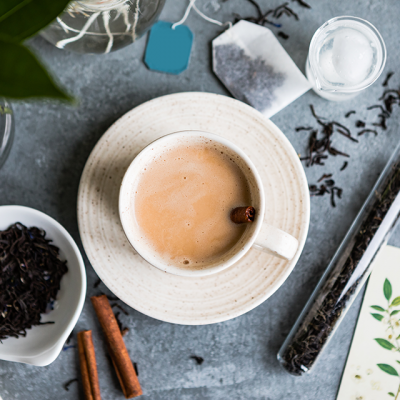Coffee or Tea?
More than half of Americans over the age of 18 drink coffee every day. That’s over 150 million daily coffee drinkers! Coffee is clearly engrained in our culture, and studies show that moderate coffee consumption of three to four cups per day may actually increase lifespan. Coffee drinkers may also benefit from a reduced risk of many chronic diseases like Parkinson’s, cardiovascular disease, type 2 diabetes, and certain cancers.
In addition to the benefits that coffee imparts, caffeine has been shown to induce autophagy, the antiaging process that my book Glow15 is built around, for its ability to boost youth, vitality, and radiance. Caffeine is considered a good stressor that leads to autophagy because it helps your cells clean out and recycle the junk that gets accumulated with time. As a result, you can access your most radiant glow, inside and out.
I was raised in England where tea is a ritual built into the fabric of daily living. Because I love tea so much, I wanted to create a delicious beverage that would not only capture the autophagy-activating properties of caffeine, but also impart the added benefits of certain polyphenols, or plant compounds that are especially powerful in boosting your health (I call them Powerphenols). After researching and interviewing experts in various fields, it became clear that I needed to include EGCG from green tea and citrus bergamot found in Earl Grey tea. These two compounds, in particular, have properties that will supercharge autophagy. I always break my intermittent fast with a cup of AutophaTea, adding a bit of goodfats from coconut oil that gently transitions me off of my fast. This could also be coffee with a tablespoon of organic grass-fed cream.
Coffee versus tea comes down to individual preference. You can feel confident you’ll get the autophagy activators from caffeine whether you drink it in the form of coffee or tea. I emphasize the quality of these options, no matter what you choose. Look for organic items that are Fair Trade Certified if possible; non-organic products can have pesticides that contribute to toxicity and inflammation in the body. You can also feel good knowing that your money is supporting practices that are sustainable for the environment and local communities.
One thing you might consider is how you personally view your favorite cup of brew: is it a crutch you need to use to get through the day? Is it a ritual that you honor and cherish because it supports your health and activates your autophagy? It’s okay either way, no judgment. When your body gets the opportunity to cleanse itself from chronic inflammation and toxicity, your metabolism works better, your brain thinks more clearly, and your overall feeling of wellness is enhanced. Your body will no longer look to crutches and cravings to get you through your day. It’s liberating when you don’t have to rely on crutches, but instead, choose the options that uplift your health.
Another thing I want to mention is that caffeine affects different people based on their genetics. It’s the reason why you may be able to have a cup of coffee at 7:00 pm at night, while your best friend will be up for two nights with insomnia. For this reason, I like to emphasize the importance of personalizing the Glow15 plan to meet your unique needs. If you find you’re sensitive to caffeine, I recommend that you stop drinking it after 2:00 pm, or switch to decaf versions.
Another tip to get the most out of your caffeine consumption, whether it is coffee or tea, is to drink it before you exercise. In the Glow15 program, I refer to this as “pregaming with caffeine to increase your autophagy and enhance your performance.”
To Choosing What’s Right for You,





